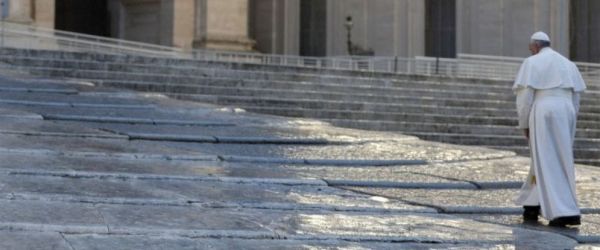The Gospel [...] is the resurrection of Lazarus (cf. Jn 11:1-45). Lazarus was Martha and Mary’s brother; they were good friends of Jesus. When Jesus arrives in Bethany, Lazarus has already been dead for four days. Martha runs towards the Master and says to Him: “If you had been here, my brother would not have died!” (v. 21). Jesus replies to her: “Your brother will rise again” (v. 23) and adds: “I am the resurrection and the life; he who believes in me, though he die, yet shall he live” (v. 25). Jesus makes himself seen as the Lord of life, he who is capable of giving life even to the dead. Then Mary and other people arrive, in tears, and so Jesus — the Gospel says — “was deeply moved in spirit and troubled.... Jesus wept” (vv. 33, 35). With this turmoil in his heart, he goes to the tomb, thanks the Father who always listens to him, has the tomb opened and cries aloud: “Lazarus, come out!” (v. 43). And Lazarus emerges with “his hands and feet bound with bandages and his face wrapped with a cloth” (v. 44).
Here we can experience first hand that God is life and gives life, yet takes on the tragedy of death. Jesus could have avoided the death of his friend Lazarus, but he wanted to share in our suffering for the death of people dear to us, and above all, he wished to demonstrate God’s dominion over death. In this Gospel passage we see that the faith of man and the omnipotence of God, of God’s love, seek each other and finally meet. It is like a two lane street: the faith of man and the omnipotence of God’s love seek each other and finally meet. We see this in the cry of Martha and Mary, and of all of us with them: “If you had been here!”. And God’s answer is not a speech, no, God’s answer to the problem of death is Jesus: “I am the resurrection and the life” ... have faith. Amid grief, continue to have faith, even when it seems that death has won. Take away the stone from your heart! Let the Word of God restore life where there is death.
Today, too, Jesus repeats to us: “Take away the stone”. God did not create us for the tomb, but rather he created us for life, [which is] beautiful, good, joyful. But “through the devil’s envy death entered the world” (Wis 2:24) says the Book of Wisdom, and Jesus Christ came to free us from its bonds.
We are thus called to take away the stones of all that suggests death: for example, the hypocrisy with which faith is lived, is death; the destructive criticism of others, is death; insults, slander, are death; the marginalization of the poor, is death. The Lord asks us to remove these stones from our hearts, and life will then flourish again around us. Christ lives, and those who welcome him and follow him come into contact with life. Without Christ, or outside of Christ, not only is life not present, but one falls back into death.
The resurrection of Lazarus is also a sign of the regeneration that occurs in the believer through Baptism, with full integration within the Paschal Mystery of Christ. Through the action and power of the Holy Spirit, the Christian is a person who journeys in life as a new creature: a creature for life, who goes towards life.
May the Virgin Mary help us to be compassionate like her son Jesus, who made our suffering his own. May each of us be close to those who are in difficulty, becoming for them a reflection of God’s love and tenderness, which frees us from death and makes life victorious.
[Pope Francis, Angelus 29 March 2020]












